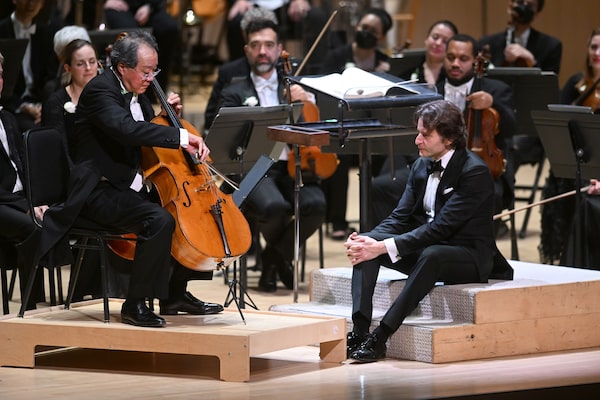
The Toronto Symphony Orchestra celebrated its 100th birthday with a performance by award-winning artists Yo-Yo Ma.Jag Gundu/Toronto Symphony Orchestra
The Toronto Symphony Orchestra celebrated its 100th birthday with champagne, a famous cellist and a powerful Mi’kmaw work, in a mixed program of new and old. While not wholly acknowledging the breadth of the organization’s performance and recording history, the concert featured moving performances by award-winning artists Yo-Yo Ma and Indigenous artist Jeremy Dutcher, which underlined the importance of creative partnership and conveyed hopeful signs for the TSO’s future.
The concert opened with a land acknowledgment featuring Dutcher and dancer Sarah Prosper – his soaring vocals and her swirling movements working seamlessly to set a beautifully meditative atmosphere.
Carnival Overture Op. 2, by Czech-Canadian composer Oskar Morawetz, was presented with energetic momentum, with TSO music director Gustavo Gimeno emphasizing the work’s melodicism through a focus on the strings.
Given the nature of the occasion, and Morawetz’s considerable stature within Canadian classical history, more substantive works by the composer might have been a better choice here, especially given that Carnival Overture was premiered not in Toronto but in Montreal in 1947. The program might have included Morawetz’s Second Symphony (1959), commissioned by the Toronto orchestra and later recorded with conductor Jean Deslauriers, or his vocal work From The Diary Of Anne Frank (1970), premiered with Canadian soprano Lois Marshall.
The mood at the 100th anniversary concert, however, was emphatically upbeat, undoubtedly a response to challenges the COVID-19 pandemic has presented to Canadian performing arts organizations over the past 2½ years.
That peppy mood was most clearly conveyed through Leonard Bernstein’s Symphonic Dances from West Side Story, given a punchy, rhythmic reading by the orchestra, which participated in the finger-snapping of the work’s prologue, and offered jubilant shouts of “mambo!” later.
Gimeno’s history as a percussionist – he was once a member of the Royal Concertgebouw Orchestra and performed under famed conductor Bernard Haitink – was clearly evinced in the energetic exchange between maestro and the TSO’s busy percussion section, which lent a palpable sense of momentum that ricocheted throughout various sections.
That feeling had its downsides; it led to an unfortunate lack of co-ordination in some spots, and underlined persistent volume issues within the orchestra (one made so noticeable during a recent concert featuring Bruckner’s Symphony No. 4). Such missteps marred moments requiring greater nuance, with the West Side Story finale in particular lacking the quietude demanded within the dramaturgy. Still, Bernstein’s sonic montage, based on his award-winning 1957 musical, had audience members nodding heads, tapping toes, slapping thighs; it was the fun element in full force.
The program’s second half offered a thoughtful counterpoint. Dutcher, a member of the Tobique First Nation in New Brunswick, and Ma performed The Honour Song by George Paul, in an arrangement by Dutcher and orchestrated by Owen Pallett.
Originally a Mi’kmaw song, The Honour Song has “always been in my constellation,” Dutcher says in the program book. The work has evolved from the version featured on his 2017 Honour Song EP to a collaboration with Ma that appears on Ma’s 2021 album Notes for the Future.
Dutcher’s closeness with the material was conveyed with gripping conviction, his clarion tenor blending with Ma’s lyrical playing to create a powerful, if too brief, experience amid the celebrations. A work at once epic and intimate, the integration of language, song and orchestral instrumentation poetically weave elements of past, present and (hopefully) future into an entrancing sonic tapestry.
That combination of soaring musicality and confident lyricism extended into a powerful performance of Dvorak’s famous Cello Concerto in B Minor, Op. 104, a work Ma has performed frequently over the course of his multidecade career.
The conversational nature of the piece, with its chamberlike scoring and clear melodic lines, was underlined in the many exchanges between strings and soloist, with Ma forcing a close listening by both musicians and audience alike. With delicate textural variance and ever-watchful dynamism, Ma’s thoughtful reading of the work, particularly in the quiet second movement (Adagio ma non troppo), was a master-class of lyrical control.
With considered vibrato and shapely phrasing, Ma offered a reading that never wallowed but complemented Gimeno’s careful shading. Only occasionally was Ma drowned out by an overzealous brass section, most noticeably in the piece’s first movement (the Allegro).
Loudness is not analogous to expressiveness, which Ma demonstrated with quiet, convincing intensity, and which extended into his choice of encore, the traditional Catalan folk song Song of the Birds (El cant dels ocells), made famous through Pablo Casals’ cello version.
The quiet confidence exuded by the soloist was conveyed with equal grace by the conductor; such clear musical understanding between Ma and Gimeno yielded glorious results for the TSO’s 100th anniversary concert, and inspired new hope for the future.
Sign up for The Globe’s arts and lifestyle newsletters for more news, columns and advice in your inbox.